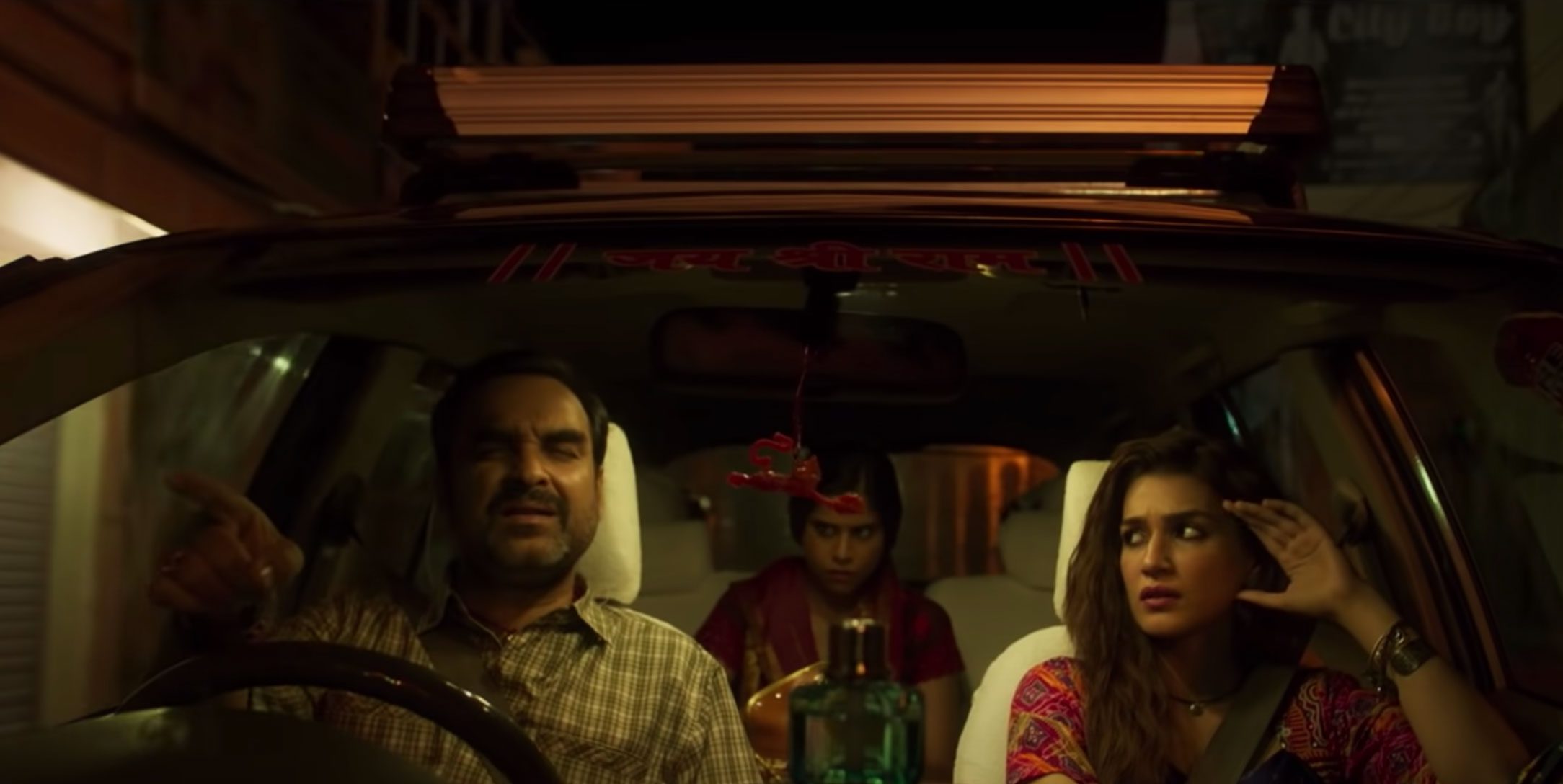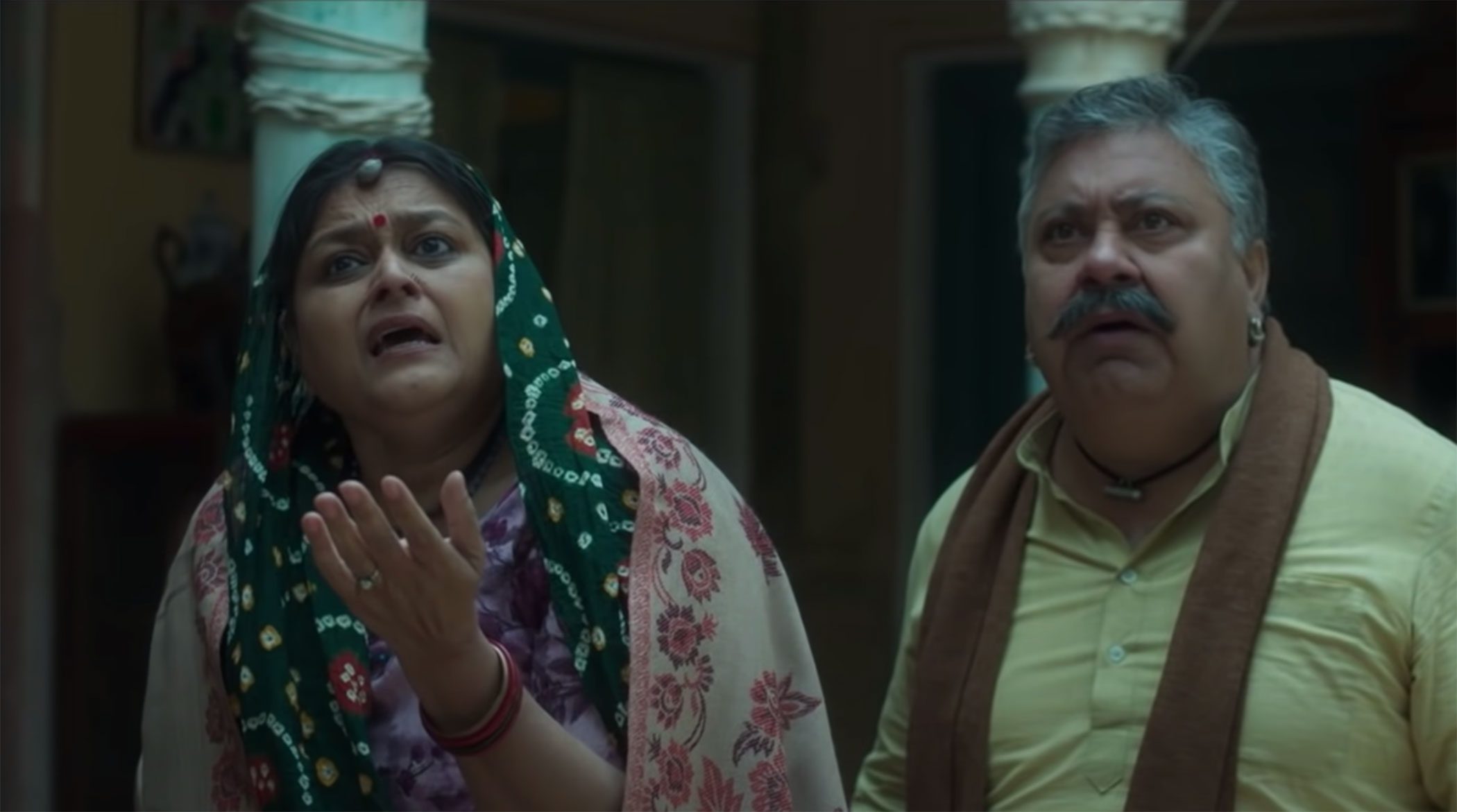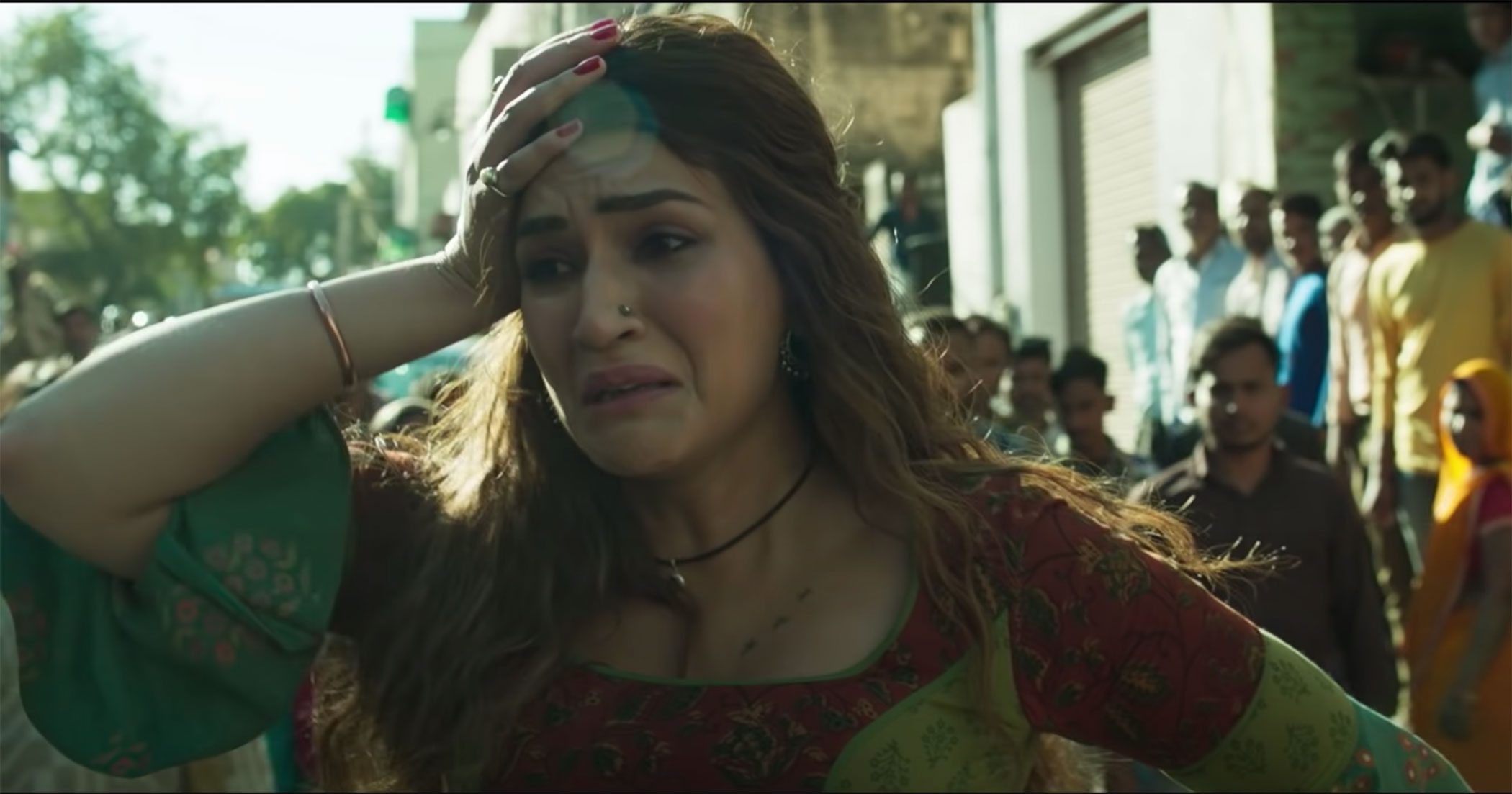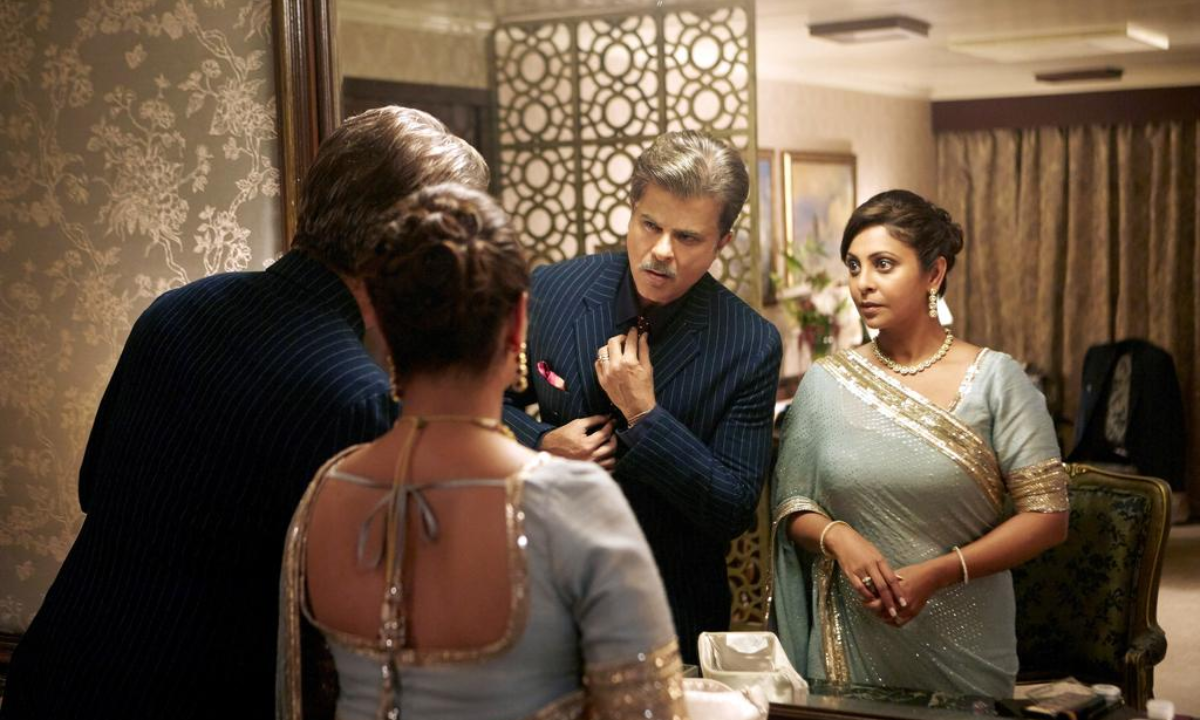‘Mimi’ Review: Kriti Sanon Shines, Pankaj Tripathi Charms In A Moving But One-Dimensional Surrogacy Drama That

Raise your hands if the arrival of Mimi before the expected due date of July 30 left you both surprised and happy. Because it did me., and I was really looking forward to it. In a recent lecture I attended on feminism and bioethics, I got to delve deeper into transnational surrogacy, the ban on commercial surrogacy in India (2015) and the Surrogacy (Regulation) Bill (2019) that is currently required to be passed in the Lok Sabha before it becomes a law that permits only altruistic (no money exchanged) surrogacy for infertile married Indian couples. Naturally Mimi, directed by Luka Chhupi director Laxman Utekar, and starring Kriti Sanon, Pankaj Tripathi and Sai Tamhankar, was a hot topic during that discussion because it tackles issues that are very central to this discourse and debate on the surrogacy bill. And of course, there’s a return of the Kriti Canon-Pankaj Tripathi duo, who I quite enjoyed watching in Bareilly Ki Barfi.
Mimi, which is produced by Dinesh Vijan’s Maddock Films and Jio Studios, is loosely based on the Marathi film Mala Aai Vhhaychy, by Samruddhi Porey. Porey also co-writes the story, screenplay and dialogues alongside director Laxman Utekar and Rohan Shankar. The music and background score are by A.R. Rahman.
View this post on Instagram
Since the trailer release, Mimi attracted the audience into looking forward to a film that was the perfect balance of emotional and funny, only elevated by its supporting cast of Manoj Pahwa, Supriya Pathak, Amardeep Jha and Sharukh Shaikh. And I can understand why. This cast inspires a certain guarantee of a good performance that instantly builds an emotional connect, and we already know their humour is bang on. What remained then was to see if the story was convincing, did justice to the many facets of surrogacy and if it was told at a pace that held on to the viewer’s attention.
Did Mimi deliver a healthy one on all those fronts? Let’s find out!
What’s Mimi about?
Bhanu Pratap Pandey (Pankaj Tripathi) is a taxi driver, driving a young American couple, John (Aidan Whytock) and Summer (Evelyn Edwards), around north India when he finds out their agenda isn’t just tourism but to find a surrogate mother to have their baby. Initially shocked and confused, he eventually understands their requirements of a fit and healthy young woman who can bear a healthy child without any health complications. In Rajasthan, they spot Mimi (Kriti Sanon) performing at their hotel, and her dancer physique and beauty convinces them someone like her would be a perfect surrogate. And the ever eager to serve Bhanu, having been promised a substantial sum agrees.
He manages to convince Mimi, who dreams of moving to Mumbai and becoming a heroine with her BFF Shama (Sai Tamhankar) by her side, and needs the money that John and Summer can give her for being their surrogate. Once Mimi becomes pregnant, she finds lies to her parents (Manoj Pahwa and Supriya Pathak) about travelling for a shoot, and instead shifts to Shama’s home (a few neighbourhoods away) for her pregnancy term, while pretending to be Shama’s distant cousin, Chand. Bhanu, on instructions from the American couple (and money) stays back to help, and has to pretend to be Shama’s brother-in-law, Naseeruddin/Nawazuddin.
The Mimi trailer, as do most trailers from Bollywood, reveal much about the central conflict of the film. The couple for some reason which isn’t hard to guess, refuses mid-term to take the baby. Mimi, supported by Shama and Bhanu, is then left to make a crucial decision—should she keep the baby, or like most other Indian surrogates who end up in this situation (there are many), abort it?
The rest of the film emerges from Mimi’s decision and the repercussions of that choice on her family, her Bollywood ambitions, and the society she lives in.
Also Read: 5 Thoughts I Had About The Mimi Trailer: Kriti Sanon, Pankaj Tripathi Are Back And We’re Expecting… An Interesting Surrogacy Drama
Mimi is a predictable story that still manages to charm with its emotional tugs and innocent humour
I watched Mimi with my mommy, with my father and brother joining midway. And once they joined, they didn’t leave until the end credits rolled. If there’s something to take away from this, it’s the fact that Mimi has the right emotional hook to reel you in and keep you interested until the end, even when the story gets predictable.
And predictable it is. You know Mimi is going to keep the baby. And once you’ve met her family, you know that they might be angry at first, but they’re going to support her through it. There’s more that happens towards the end, and all of it is easily anticipated. And yet, it’s a sweet, emotional journey to experience, usually told over montages set to some soulful A.R. Rahman music, that makes you smile and feel all the feels that rush in when you see a happy family living their best lives. I think it’s pretty reflexive at this point.
Another upholder of the film’s charm is its humour. It is innocent, organic and owes a great deal to the dialogues (my mother loved most of them and so did I because they were simple and honest and impactful) and the way the actors make the best of them in their unique style.
Towards the end, however, attention begins to waver because, as I mentioned before, you know how this is going to end so it doesn’t make sense to prolong it with yet another montage (I think there are 3 total?). The last 30 minutes or so of the film feel a tad drawn out.
A.R. Rahman’s music is a nice complement and the film looks pretty great visually
Two things we absolutely need to talk about. The first is ‘Param Sundari’, which could’ve been your typical item song/introductory number for Kriti Sanon, but is such a delight to both listen and behold. I remember telling my mother that the film’s music was composed by A.R. Rahman, as the song played. And she instantly lit up saying that it all made sense now why this song felt different than the usual ones and was so good. I liked the bit where Sai Tamhankar’s Shama is the one singing, and the lyrics are thankfully more adoration than vulgar leching that we now have for song lyrics. Sigh. Rahman’s music isn’t something that will blow your mind, but it definitely adds gravitas and complements It well.
The film looks good, and I have no discernible complaints there. I particularly enjoyed Mimi’s room, with it’s Bollywood scrapbooked walls (fellow Ranveer Singh fan here, who got super jealous watching Mimi caress the abs on his cutout!), which eventually made way to accommodate the presence of a new star in her life.
Kriti Sanon shines in one of her best performances yet, and Pankaj Tripathi charms per usual
If you’ve been on social media since last night, Mimi is being called Kriti Sanon’s career best performance. And to a great extent it is, because it gives the actor a chance to flex those acting muscles in a role that is unlike anything she’s played before. She has mostly done romances or comic capers, but this one lets her play on the emotional front foot, and I think she does a pretty good job. I do think the accent is a little off, and I would’ve probably preferred her without it. I’d like to think the whole notion that a small town belle going to the city of dreams to become a heroine would at least work on her accent as much a she did on her dancing skills. So if we could retire that trope, that would be great. If not, perhaps a little more work on the accent to make it feel authentic is required.
View this post on Instagram
As is my ritual for any Pankaj Tripathi film I like him in, I am again going to ask “Kaise kar lete hain har baar aap, Tripathi ji?” until he personally gives me an answer. Yet another role that seemed custom-written for PT, or even if not, he found a way to make it his own as he always does. His Bhanu is perfect as someone who’d belong to the tourism/hospitality industry, and who is equal parts charm and simplicity, both utterly unintentional but effective nonetheless. He has some of the best dialogues in the film of course, both funny and impactful, and that’s another female ally character that Tripathi ji effortlessly has in the bag. I love his scenes in the car with Kriti and Sai, with his wife and mother, as well as the scenes with the Maulvi!
The rest of the cast puts forth decent performances; both Manoj Pahwa and Supriya Pathak are just so adorable as Mimi’s parents!
Also Read: ’14 Phere’ Review: Vikrant Massey, Kriti Kharbanda Film Has A Good Heart, And Yet, Reality Crashes This Wedding
The way Mimi tackles the issues around surrogacy is a tad one-dimensional
We’ve talked about the good and the okay, but let’s focus a little on the hits and misses with the central theme of the film—Surrogacy. A little background for those who might not be aware, but tourism surrogacy / transnational surrogacy was a pretty huge deal in India a few years ago. The country, with its numerous fertility clinics, population and poverty became the leading destination for commercial surrogacy where couples from abroad would come to find a womb on rent.
When you see John and Summer list their requirements for a healthy, athletic girl to bear their child, it might sound a little too picky. But that’s just some of the most basic requisites, and these can get a lot more niche. And as the opening scene with the couple’s conversation with a ‘dealer’ will tell you, it was a legit marketplace with women and their attributes commodified and delivered depending on requirements.
Of course, it wasn’t all bad. Like in Mimi’s case, many women turned surrogates for money. For them, surrogacy with modern methods was sometimes a much safer way to earn a substantial amount that other options, like working in hazardous factory-like conditions, or even prostitution. And as we see with how kind John and Summer are initially with their surrogate, these women were often much better taken care of as surrogate mothers in terms of food and emotional well-being than when they were pregnant with their own children.
Commercial surrogacy was banned in India in 2015, perhaps because what happened in Mimi was happening a lot with women in the country, when the parents refused to take the baby due to several reasons. And while this was a rampant practice, there were no strict laws governing this ‘business’, which meant the issues that arose in Mimi’s case regarding the legal custodian of a surrogate child was a major grey area that incited heavy legal and philosophical debate.
Mimi, then, being singularly focussed on one aspect of surrogacy, is a very sanitised version of reality and the power dynamics that are at play. Mimi’s explosive revelation about her pregnancy to her family is very easily resolved. We see Mimi’s world after the birth of child in a cocoon of the love and support of her family and friends, which I might add, is an effective way of putting out that a support system, especially parental, is so crucial in times like these for women.
However, there’s nothing about the outside world that might not be so easily accepting of an unwed mother with child that looks Caucasian. We don’t even see her address the giving up of her Bollywood dream, which she clearly nursed since a young age, which makes her choice of motherhood over aspirations feel very easy and driven by biology. The latter is a very strong argument that society uses when trying to convince women to give up their careers and dreams because motherhood is the greatest achievement for a woman. It’s funny when Bhanu says it comically in the start of the film to convince Mimi to be a surrogate, but for her to take it so seriously without misgivings… I couldn’t digest it. I wanted Mimi to fight for her dreams, at least try a swing at them instead of just becoming this devoted mother happily.
Another thing that bothered me was how the film, through Mimi, talked about abortion. It wraps the whole ‘abortion is murder’ in this deeply emotional dialogue that Mimi says to her doctor who suggests it, which made me uncomfortable. The righteousness of it shames other women’s choice to put themselves over an unborn entity, especially when the pregnancy was not their doing in the first place. Sure, you could say that Mimi did all of this of her own volition, she wasn’t forced and she was getting paid for it. But choice does not always mean empowerment. In this situation, even though Summer was the one dependent on Mimi for her baby, she was still the one with the upper hand, and in a better position to make informed choices. And if the choice turned out to be wrong, Summer again had more power to correct them or start again, compared to Mimi. Mimi was lucky to have a support system, not every woman has that.
This also speaks to my third issue with the film, which leaves Mimi and her family’s happiness at the mercy of the white people. They giveth and taketh away a lot during the course of the film, not caring much about Mimi’s individual hopes and dreams and happiness. And in the end, when you see a happy family portrait where everyone is smiling together and thanking the American couple for their kindness and generosity, I cannot help but be a little pissed off that they’ve forgotten just how fragile their relief could be.
I think the film could’ve probably snipped bits in its first half to give the second half some more time to explore the legalities of surrogacy and of thought processes women who are surrogates, their motivations and social context of these decisions. Because let’s be real here, there’s a lot less emotion and a lot more of tactless ‘court-kacheheri’ business involved in these matters. That perhaps would’ve been a much closer to reality depiction of surrogacy and the plight of surrogate mothers in India.
Verdict: Despite its flaws, I’m glad films like Mimi are getting made
Currently, a bill is in the pipes that wants to legitimise only altruistic surrogacy and that too only for heterosexual married Indian couples of five years at least, who can prove infertility. The bill has its share of supporters but is also being heavily criticised by women’s rights groups on several fronts, because it assumes that women would just turn surrogates out of the kindness of their maternal hearts. And while it presupposes choice, altruistic surrogacy could come with its own dangers more potent that commercial surrogacy, in terms of exploitation and pressure.
Cinema is instrumental in effecting social change at every level. And for that, we need more films like Mimi that talk about subjects like surrogacy, which is one of the most debated issues pertaining to women, the world over. I won’t say Mimi is perfect in its message or execution, but I’d still give it a watch for being a stepping stone that steadily ushers the audience into the general direction of discussions and discourse around topics like women’s reproductive rights, agency, choice, and empowerment.
It helps that the film is packed with emotion and good-natured humour, and some decent performances from its cast. I’m giving it a pre-emptive star in the hopes that people watch it, and try to educate themselves on this issue that needs more varied viewpoints.
Mimi is currently streaming on Netflix and Jio Cinema.




















